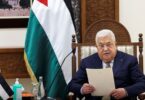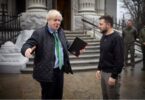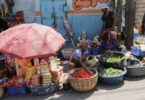Maria Maalouf
The outbreak of violence in Sudan last week, which is now simmering between the country’s two most powerful military leaders and their forces, was sadly predictable. The alliance of convenience between the two warlords — built on a shared contempt for the democratic aspirations of Sudanese civilians — has crumbled into a battle for supremacy, in which civilians suffer collateral losses.
After the popular revolt that toppled Omar Bashir in 2019, Abdel Fattah Al-Burhan — the commander of the Sudanese Armed Forces — and Mohammed Hamdan Dagalo, aka Hemeti — the commander of the Rapid Support Forces — overcame bureaucratic and ethnic prejudices by championing a common cause. Unfortunately, their partnership was built on undermining, delaying and obstructing Sudan’s transition to democratic civilian rule. The two leaders sought to evade accountability for crimes dating back to the genocide in Darfur and the recent massacre of more than 120 unarmed protesters in June 2019.
Above all, their arrangement was based on the shared understanding that the Sudanese army would never be accountable to civilian authorities. But they have yet to decide which leader will end up at the top once civilians are permanently sidelined. For the Sudanese army and the Rapid Support Forces, the partnership has been very successful. They pretended to be partners of the Sudanese civil parties while exploiting their bickering; they have derided international partners who support a civilian-military transitional government; and they pretended to be responsible parties on the world stage by pledging to participate in counterterrorism operations and declaring their support for the Abraham Accords and normalizing relations with Israel.
The Sudanese Resistance Committees — the tireless, decentralized protest movements that were the primary engine of Bashir’s ouster — generally remained suspicious of the two military leaders. Still, the international community adopted what it convinced itself was the only realistic approach — dealing with the two warlords. The Sudanese Armed Forces and the Rapid Support Forces were firmly embedded in all aspects of Sudanese life. Dagalo, in particular, sought to enrich himself, including through mining schemes with the Russians. Avoiding severe consequences for repeated acts of impunity that might have led to change, the West has instead appeased and courted the two warlords.
In October 2021, during Jeffrey Feltman’s tenure as the first US special envoy to the Horn of Africa, he and his team of American diplomats held a series of meetings to address what Al-Burhan and Dagalo insisted were their concerns about the transitional arrangements. In a closing session that included leaders and civilian Prime Minister Abdalla Hamdok, the US delegation presented ideas for easing tensions and addressing some of the leaders’ concerns to renew momentum behind the civil-military partnership. The two commanders and Hamdok adhered to the plan proposed by the Americans. But five hours later, despite US support for the compromises they favored, the two leaders staged a coup, arresting Hamdok, his government and dozens of others. The American team tried to work with the two commanders in good faith, but their move showed that they never intended to reciprocate. Since then, history has repeated itself over and over again — the armed forces and RSF leaderships have made commitments, only to break them later. More recently, the UN, the African Union and the Intergovernmental Authority on Development facilitated discussions on forming a civilian government.
The Quartet — the US, the UK, Saudi Arabia and the UAE — helped broker a framework agreement. One can argue whether the formation of a civilian government in early April, as planned during these discussions, would be sufficiently credible in the eyes of the resistance committees. But that is all in the past now, as the Sudanese army and the RSF have given up on negotiations and decided to go after each other instead. Al-Burhan and Dagalo seem to be fighting a fight to the death.
With impressive speed, regional leaders agreed to send a team of three heads of state to Khartoum, showing that Sudan’s neighbors know that the region, too, would suffer in the event of an all-out civil war. The African Union, the UN, the EU and the US can be expected to support this initiative, and such support will be essential. But given that the international community has been deeply tarnished by its insistence on working with the same leaders responsible for the recent violence, the region will have to take the lead.
A ceasefire based on power-sharing between the two warlords will not be stable and it is not easy to ignore the Sudanese people’s aspirations for democracy and civilian rule. Even at the peak of Al-Burhan and Dagalo’s partnership, brute force did not defeat the resistance committees. Until now, civilians in Sudan have been facing a united front composed of Al-Burhan and Dagalo. Assuming it survives, it is understood that the civilian authority will better confront a security apparatus that is likely to be divided and fractured and less able or willing to impose its rule. This outcome may be unlikely, but it is the only glimmer of hope one can find in this horrific tragedy.







